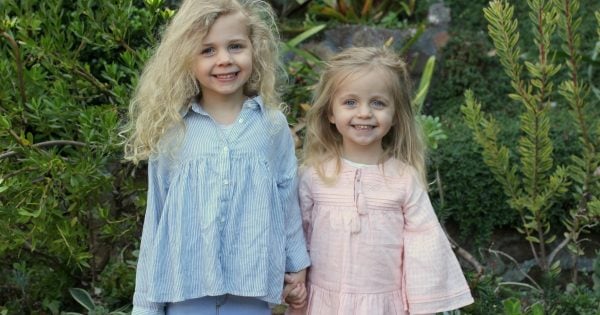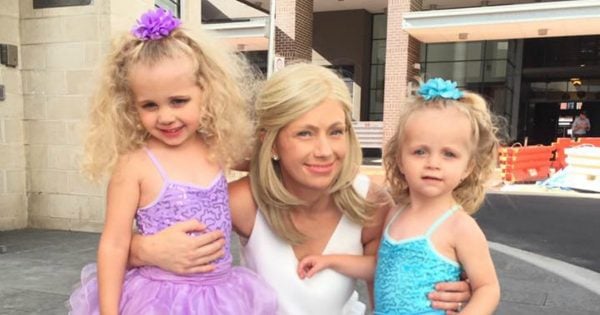My beautiful daughters Mia, four and Halle, three have something very special in common – they were both born with moderate hearing losses.
Mia was just three days old when she failed the mandatory newborn hearing screening. I was blissfully enjoying my first moments of being a new mum when a nurse came in to collect Mia for her screen. I remember letting her go, enjoying a cup of tea and thinking how utterly happy I felt.
When the nurse returned ten minutes later, I said “I hope she passed!” – but the nurse shook her head. All of a sudden, I was alone in the room holding my beautiful daughter with a horrible feeling in my stomach. When the room filled up with family and friends during visiting hours, I remember being in a kind of trance while I tried to join in conversations with everyone.
As a first-time mum, I was in complete shock. I wasn’t prepared for my baby to ‘fail’ something – and this news amplified the emotional rollercoaster that many new mums go on in the early days of motherhood.
I had never felt so scared and helpless. I spent the next week convinced Mia would never talk. I thought she would always be different to others, be socially and emotionally effected in a negative way. I felt I had failed her as a mother. I felt as though no one else could relate to me, or understand. It made me angry when I saw that everyone else had perfectly healthy babies and I was ‘the one’ they felt sorry for.
Looking back now, the way I felt was not the reality of the situation. In most cases, children with hearing loss are able to learn to talk or they choose to communicate in other ways. However, having had no experience with hearing loss up until that point, I wasn’t thinking clearly in this early time.




Top Comments
Deaf Children Australia have a program of 'Parent Mentors' that meet with parents of newly diagnosed children at the Lady Cilento Children's Hospital, Brisbane.
If anybody would like to talk to someone, contact Deaf Children Australia. ☺
My son also failed his newborn hearing test, officially, on day 3 and again at 2 weeks, and full scale hearing test at 6 weeks. It was onl in one ear though. But on that day 3 test, when the baby blues kicked in, it was a hard, hard day.
He was diagnosed with likely ANSD, based on the wave lengths they were receiving. I was being asked if I had a cold during pregnancy and was suddenly feeling like I was to blame.
The reality is, there’s so much they don’t know, especially about ANSD. At 2.5 - we’re still doing tests through Hearkng Australia (a wonderful organisation), to map the full extent of hearing loss. But as my son has one working ear, he’s doing so well learning language and listening (for a toddler anyway) - he good ear doing all the hard work.
I’ve heard such good things about the Shepherd Centre. My husband and I feel so fortunate our son is developing so well, and decided to let their services be used for other parents in greater need than us. We will continue testing for now and then see how he goes in school before introducing any interventions. So far he’s doing well in daycare.
But yes - a little support to parents in those first few weeks from other parents would be wonderful! I felt very raw and inadequate and oh so vulnerable.
My 10 year old bypassed the newborn screening and went straight to a full hearing test due to microtia. He has one good ear that has had multiple grommets inserted over the years to keep it clear of fluid to ensure his speech and language development. He sees ENT again next month to discuss the possibility of a hearing implant (not cochlear). He has perfect hearing in the ear but the canal is so small not enough sound get through. It’s a decision he will be making as it is not an essential need due the good hearing in the other ear.
My son was born with multiple issues and a unilateral hearing loss was quite low on the list of things to be concerned about but overall there was very little support for us. Dr Google came in very handy to help me understand what was going on when we were given possible diagnoses.